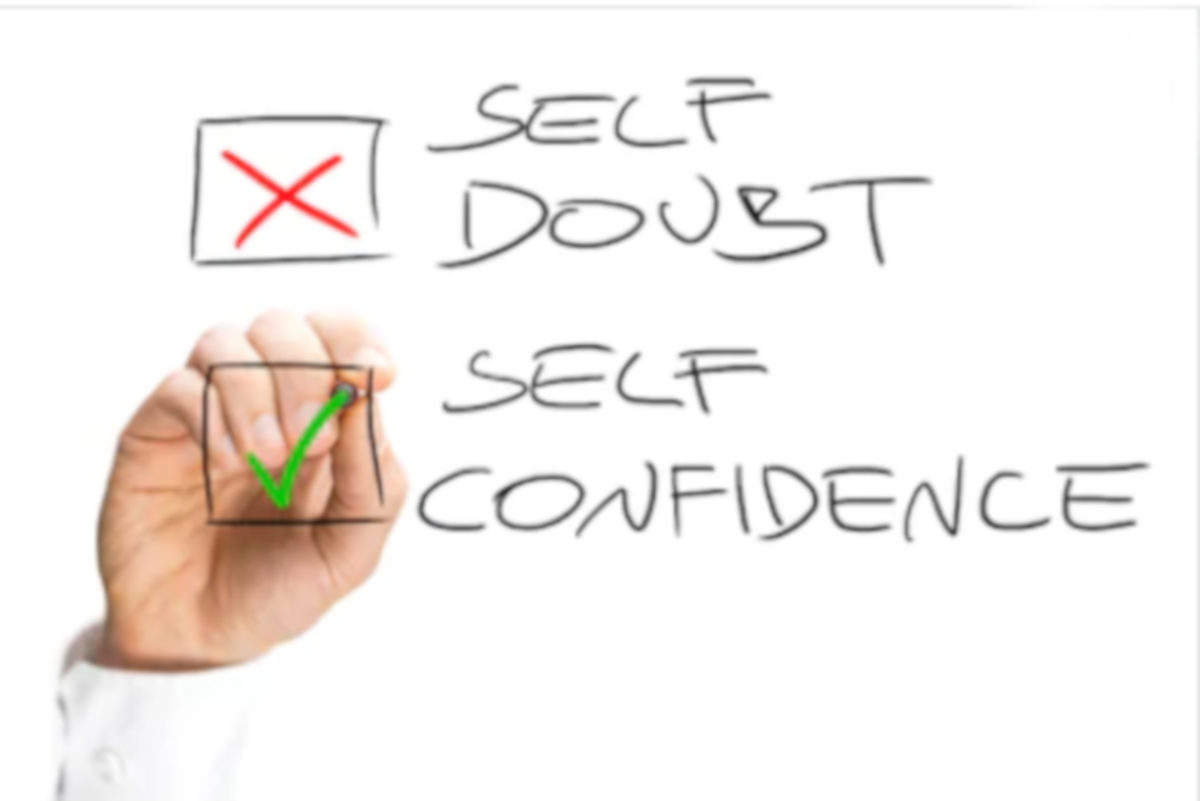- HubPages»
- Health»
- Personal Health Information & Self-Help»
- Mentally & Emotionally Balanced Living
Are You Tired of Negative Self Talk?
Many researchers and writers over the centuries have been captivated by investigating the human “inner voice also know as self-talk." Everyone experiences " self-talk” chatter in their head.
We listen to the chatter in our heads day in and day out. If the chatter is harmful, then we might think bad about ourselves, or we are going crazy. If the chatter is positive, then we experience confidence and positiveness.
First of all, studies have discovered self-talk is normal. The studies found that our inner voice helps us to determine how we respond to ourselves. Self-talk determines how we think about ourselves, make our decisions and aid us in deciding how we will react to situations and others in our lives.
An exciting result of all researcher's efforts was that they discovered after experiencing a significant life situation the internal voice may become meaner, more critical, judging and shaming rather than supportive depending on how we responded to the experience.
Testimony
“I know everyone has a self-critical voice in their head. Since my rape two years ago, my self-talk has deepened my hatred for myself. My self-talk has become meaner and downright more destructive with every day. Over time my inner voice became so overwhelming that it is almost impossible for me to function.”
- SK
Beating Yourself Up After Traumatic Event Is Normal
After surviving acts of abuse or trauma, as well as natural disasters, the person's self-talk intensifies and attains a higher degree of influence on his or her thoughts, emotions and attitude toward themselves. That is due in part to not feeling safe after the traumatic event. A traumatic event creates negative core beliefs and embeds them in the victim's subconscious mind.
Self Experience
I always thought it was normal for people to put themselves down if something went wrong his or her life. I began to believe that something was wrong with me. After my childhood abuse and growing up as a survivor, I would mentally and emotionally beat myself up from the time I woke up to the time I went to sleep. I thought that was normal for everyone.
I would slash myself into little pieces with my self-talk, even when things were going right, or good things were coming my way. I became extraordinarily compliant and loyal to my self-critical voice which told me about me in negative words. I let my self-talk dictate what to do and how I should react. Over time, I learned that this self-flagellation voice never did anything good for me, except to spiral me down into a very dark place. It caused me to loathe myself even more. I lost my confidence, self-esteem, self-worth, and relationship with myself. I experienced more episodes of dissociation to not listen to all that harassment in my head. Each time I obey or believed my inner voice, it became harder and harder to crawl out of my self-imposed deep emotional hole.
Indeed my negative and self-defeating self-talk was like having my own emotional and verbal abuser in my head.
Not My Fault
I learned the critical content of my self-talk was formed from statements made to me during specific hurtful events. This material I accepted without my approval, embedded into my subconscious mind.
What I didn't understand was that inappropriate emotional attachment caused by the perpetrators allowed negative beliefs about myself to form. What emotionally bonded me to them was the heightened emotions of fear, hurt, pain, and terror that my abusers created during the abuse. It was these sharp, intense negative emotions that allowed those criticisms, judgments, and thoughts of shame and blame to bypass my perceptual filters (my defenses). Once past my filters, the negative beliefs were accepted straight into my subconscious mind as mind code. See, it is the power of the emotions (whether negative or positive) which allows critical messages to enter a person's head unchanged, unfiltered and unchallenged.
More importantly, these accepted criticisms become the content that forms my core beliefs about myself and determined my thoughts. These core beliefs then became the content for my self-talk that tortured me daily. Statements like “you’re nothing,” “you caused this to happen,” “you have no value,” and “you’re damaged.”
As I grew up, I heaped on myself tons of self-doubts, blame, shame, judgment and negative beliefs about me onto myself, not my perpetrator. The critical messages strongly influenced all my thoughts. They affected my relationships not only with myself but also with others around me and my perceptions of the world.
When I felt strong, my PTSD symptoms were not as active. I was able to ignore my self-critical messages and accomplish things in my life. At other times, I couldn't ignore those messages; I had no power to stop them. These self-critical messages became with extreme emotions. Those self-critical messages governed all my responses or lack of response. Now that I am older, I have learned this critical self-talk in my head is the result of having experienced abuse and trauma. This experience is typical of all survivors. It happens to everyone, just not as intense. I finally found a name for this self-critical voice - inner critic.
Your Inner Voice Crushes Confidence
A side effect of listening to the self-talk was a crushing blow to my self-confidence, self-value, self-loyalty and self-love. I blamed myself for what happened even though it was not my fault. I felt disconnected from my core self, and I regularly shamed myself. The more I listened, the more I hated me. My emotional suffering increased as I allowed my critical inner voice to gain more power. My inner voice also influenced all my thoughts, emotions, and behaviors. My self-talk also governed how I reacted toward others who I loved and interacted with.
18 Signs your self talk is in charge of you
Your self-talk is in charge when it says:
You caused it
You are to blame
You are always wrongs
You are a failure
You're a loser
You are defective
You are undeserving of love
You are different than others
You will never be happy
You will never be a success
You are not allowed to feel right about anything
You are fat
You are ugly
You will amount to nothing
You are a terrible person
No one will ever love you
You are not worthy
You are not good enough
I was not alone
Now, after years of attempting to heal, as well as helping others as a therapist and now a life coach, I have gained respect for my self-talk. That does not mean I always agree with it or like it. I have grown to understand every survivor has a very harsh and cruel inner voice. Whew!! I found out I wasn't t alone as well as not damaged, not insane, nor defective. Most importantly, it wasn't my fault for the content in my inner critic.
My self-talk is that inner judgmental part of me that carries the damaging statements from my abuser. My perpetrator’s acts and statements caused my mind to form negative core beliefs about me which directly govern how I acted, felt, thought and reacted. My inner voice also distorted my view of my character and how I perform.
The negative “you” statements which my perpetrators said to me, in time, became “I” beliefs in my head. For example, “you're nothing,” over time became “I am nothing."
Through my many years of coaching others, I found that my clients identified with the term “critical self-talk.” I gave each client the assignment to write down all their self-talk statements. My clients submitted page after page of nasty comments which they heard in their heads every day. Survivors of abuse and trauma always have a harsher and crueler list. Plus their list was much longer than non-survivors.
What is the tone of your Inner Critic?
Is your inner critic:
The Joe Torre Story
I recently watched a story on Joe Torre. He grew up in an abusive home with an abusive father who harshly criticized him all the time. Even with that dark past, he worked hard in sports and achieved many awards. He attained MVP as a player eight times, nine times the all-star player and one MVP batting title.
Joe went on to become one of the most successful coaches in the history of baseball. He won 2,326 games, and 4 World Series.
He stated that his most critical part of being a baseball coach was to make sure his players respected him. What I learned from Joe's story is; if you challenge your inner critic voice, and you can beat it. You challenge it by denouncing it and that nullifies all its contents. Denouncing will turn the negative self-talk into positive self-talk.
How to change your inner voice to positive
Even with critical content embedded in your mind from childhood you formed about yourself, you retain editing power. You can triumph and overrule its content. You do not have to listen and live with the harmful substance from your inner voice. Your inner voice content is false and skewed because it is based on false and negative core beliefs.
Change can be had. You have the power to construct new content, believe it, practice it, and most of all, attach a positive emotion to them. All you need is the right tools. You can alter the content of your negative inner critic and change the content to be positive.
In order to take back your power. You have to create whole new set of inner voice content to replace the negative ones. Create new content, own them, feel them, believe them, and then live them as your truth.
In other words, you can change your inner voice content by recognizing the old self-talk, denying those messages and ideas as your truths and beliefs. Then author new self-talk content. This will change the tone of the content and your mind code immediately. Once you shift your inner talk to positive, your inner voice should be more lighthearted and supportive which will create a positive mental environment. This environment should allow you have some breathing room and be more flexible to grow, expand, risk and explore life’s possibilities.
Through this method, I was able to create new self-talk content to replace my old inner critic content. Then I was able to love, motivate and support myself with my own words. You can do it, too.
6 tips for taking back your power from your inner voice
I want to share with you a few tips on how you can calm your self-talk. If you are diligent with these suggestions, you can replace your self-talk content, which will result in easing the content of your thoughts and help them become more positive and supportive.
1. Get to know your inner self-talk, it's tone, and its possible intentions acquire from past situations
The first step toward improving your self-talk content is to activate your self-observer. Use your self-observer to listen and record the content being said in your head. Listen from a third party perspective as if you hear it on the radio. Write each statement down to help clear your head.
Once you have completed recording all statements you can then recognize each comment is an old criticism (no longer true) and an outright lie that was said to you at some point in your life by people who hurt you or made you feel bad about yourself.
The most impactful criticisms came from your closest family members whom you were emotionally attached to and loved. Understand some of the criticisms were meant to ensure your emotional and physical safety or make you a “stronger person.” But it didn't work that way. Actually, the comments were hurtful and caused you to think poorly about yourself.
Know that your mind does not have or express feelings, it records the words and repeats the words back to you through your self-talk. The replay is always automatic.
2. Take some time to evaluate each inner self-talk's statements
To reduce the influence and power of your self-talk, explore each comment and determine whether you truly deserve the negativity, doubt, self-limiting thoughts or critical comments your inner voice is expressing. Let your mind help you validate whether the content of your self-talk is true or false. Then make a note beside each critical statement on who in your life said such a statement to or about you. Next, write the situation or event in which it occurred.
The more you know, the less power the critical and judgmental content will have. Find proof of why the harmful material is wrong and unfounded. When you find the real truth, you will create a crack in the negative thought pattern and dissipate its power and influence.
But that alone is not enough to achieve mental freedom.
3. Make a realistic plan to correct your inner self-talk.
Next, list a new positive statement next to each negative self-talk comment that would counteract the negative content. A change in content will increase your self-worth and self-value.
It can be as simple as creating new content…“I deserve to be something” or “I deserve to look at myself in the mirror and love myself.” Once you have created these new statements, repeat them to yourself ten times a day for 90 days.
The trick to success in your plan is each new statement needs to be specific, measurable, timelined and feel attainable to you. Your new content becomes your action plan. Once you commit to your action plan, you need to give it life.
4. Stick with the program.
Accept and feel a profound obligation to your action plan. Follow through daily for 90 days. Change your mindset and believe you are in charge of how you think about yourself, what you believe about yourself, what you are capable of, and how you will perform successfully.
I find that I get the best results and most successful when I keep track of these activities. Track yourself by keeping a journal of your progress. That way you will be able to see your commitment, day by day for those 90 days. Keeping track of what I do daily helps me to recognize when I fall off my action plan and motivates me to get back on track.
5. Hang out with people who think positively and are supportive of you and make you feel comfortable.
Be around people who see and experience you in a positive light, support you and know you as you are. Let people who love you reflect the real you back to you. Start hanging out with people who could use support and reflect back to them how you see them in a positive light. Practice the balance of receiving and giving positive content to each other.
6. Realize that you have the power to earn respect from your inner voice.
Understand that your inner voice has been attempting to protect you, be it through doubt, negative or critical statements. But don’t let your inner critic influence your life or direct your thoughts. Earn respect from your mind by forming your thoughts. You have that power. Once you decide this, the rest is pretty much practice and patience.
If you follow these suggestions, you can alter the content of your inner voice and feel more empowered. Once empowered you will be more positive and successful in your thoughts, and your new feeling of power will manifest in everything you do in your life.
Take Away
You can change your core beliefs which feed the content to your inner voice and stop your self-limiting, self-sabotaging and self-defeating self-talk. Start today!
© 2014 Bill Tollefson








